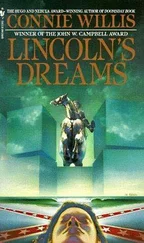Connie Willis - Bellwether
Здесь есть возможность читать онлайн «Connie Willis - Bellwether» весь текст электронной книги совершенно бесплатно (целиком полную версию без сокращений). В некоторых случаях можно слушать аудио, скачать через торрент в формате fb2 и присутствует краткое содержание. Год выпуска: 1996, ISBN: 1996, Издательство: Bantam Spectra, Жанр: Фантастика и фэнтези, на английском языке. Описание произведения, (предисловие) а так же отзывы посетителей доступны на портале библиотеки ЛибКат.
- Название:Bellwether
- Автор:
- Издательство:Bantam Spectra
- Жанр:
- Год:1996
- ISBN:0-553-37562-8
- Рейтинг книги:3 / 5. Голосов: 1
-
Избранное:Добавить в избранное
- Отзывы:
-
Ваша оценка:
- 60
- 1
- 2
- 3
- 4
- 5
Bellwether: краткое содержание, описание и аннотация
Предлагаем к чтению аннотацию, описание, краткое содержание или предисловие (зависит от того, что написал сам автор книги «Bellwether»). Если вы не нашли необходимую информацию о книге — напишите в комментариях, мы постараемся отыскать её.
Nominated for Nebula Award for Best Novel in 1998.
Bellwether — читать онлайн бесплатно полную книгу (весь текст) целиком
Ниже представлен текст книги, разбитый по страницам. Система сохранения места последней прочитанной страницы, позволяет с удобством читать онлайн бесплатно книгу «Bellwether», без необходимости каждый раз заново искать на чём Вы остановились. Поставьте закладку, и сможете в любой момент перейти на страницу, на которой закончили чтение.
Интервал:
Закладка:
“And it hit me, just like that. Bellwethers cause chaos. They’re the unseen factor.”
“I knew it,” I said. “I have to go find something. Just what I thought. You’re wonderful. Be right back.” I kissed him for inspiration, and went to find Flip.
I had forgotten she’d quit. “Three days ago,” Elaine in Personnel said. She was wearing a pair of Cerenkhov blue Rollerblades. “In-in-line skating,” she said, raising her leg to demonstrate. “It gives a much better full-body workout than wall-walking, and it helps you get around the office faster. Did you hear about Sarah and her boyfriend?”
“They broke up?” I said.
“No. They got married!”
I pondered the implications of that. “Did Flip leave a forwarding address?” I asked. “Or say where she was going?”
She shook her head. “She said to give her check to Desiderata down in Supply and she’d send it on to her.”
“Can I see her file?”
“Personnel records are confidential,” she said, suddenly businesslike.
“Call Management and ask them,” I said. “Tell them it’s me.”
She did. “Management said to give you anything you want,” she said bemusedly, hanging up. “Do you want the whole file?”
“Just her previous work record.”
She skated over to the file cabinet, got it, and skated over to me, executing a neat toe stop.
It was what I’d expected. Flip had worked at a coffeehouse in Seattle, and before that at a Burger King in L.A. “Thanks,” I said, handing it back to her, and then thought of something else. “Let me see her file a minute.” I opened it and glanced at the top line, where it said “full name, last, first, middle initial.”
“Orliotti,” it said. “Philippa J.”
Tattoos [1691]
Self-mutilation fad which first became popular in Europe in the 1600s when explorers brought the practice back from the South Seas. The fad recurred as an upper-class craze in the Edwardian era. Jennie Jerome, Winston Churchill’s mother, had a snake tattooed around her wrist. Tattooing became popular again in World War II, this time among servicemen and especially sailors, again in the sixties as part of the hippie movement, and yet again in the late eighties. Tattooing has the disadvantage of being a passing fad with permanent results.
I wrote down Flip’s last name and made a note to find out her grandmother’s maiden name and check to see if she was living anywhere near Marydale, Ohio, in 1921, and went down to Supply.
Desiderata couldn’t find Flip’s forwarding address. “She said she was going to someplace in Arizona,” Desiderata said, looking in among the erasers. “Albuquerque, I think.”
“Albuquerque is in New Mexico,” I said.
“Oh,” she said, frowning. “Then maybe it was Fort Worth. Wherever he went.”
“Who?”
She rolled her eyes. “The dentist guy.”
Of course. He had particularly specified geographic compatibility.
“Maybe she told Shirl,” Desiderata said, rummaging through the pencils.
“I thought Shirl got fired,” I said, “for smoking in the paddock.”
“Hunh-unh,” Desiderata said. “She quit. She said she was only going to stay till they hired a new workplace message facilitation director, and they did that this morning, so maybe she’s already gone.”
She wasn’t. She was in the copy room, fixing the copy machine before she left, but Flip hadn’t told Shirl where she was going either. “She mentioned something about this Darrell moving his practice to Prescott,” Shirl said, leaning over the paper feed. “I heard you and Dr. O’Reilly won the Niebnitz Grant. That’s wonderful.”
“It is,” I said, watching her yank a jammed sheet of paper out of the feed with her fingers. There were no signs of nicotine stains on them. “It’s too bad I don’t know who gives the grant. I had something I wanted to tell them.”
Shirl pushed the feed into position and closed the lid. “I’m sure the committee wants to remain anonymous.”
“If it is a committee,” I said. “Committees are terrible at keeping secrets, and even Dr. Turnbull wasn’t able to find out anything. I think it’s one person.”
“One very rich person,” she said, her voice no longer raspy.
“Right. Somebody circumstantially predisposed to wealth, who thinks for herself and wants other people to, too. When did you quit smoking?”
“Flip converted me,” she said. “Filthy habit. Hazardous to your health.”
“Umm,” I said. “Somebody extremely competent—”
“Speaking of which,” she said, “have you run into Flip’s replacement yet? It’ll make you glad you don’t work here anymore. I didn’t think it was possible to hire somebody worse than Flip, but Management’s succeeded.”
“Somebody extremely competent,” I repeated, looking steadily at her, “who travels around the country like Diogenes, looking for scientists with circumstantial predispositions to scientific discovery. Somebody no one would suspect.”
“Interesting theory,” Shirl said dismissively, centering the paper on the glass plate. “What was it you wanted to tell this person? If he or she is incognito, he or she probably doesn’t want to be thanked.” She hit a button and started to lower the lid.
“Oh, I wasn’t going to thank her,” I said. “I was going to tell her she’s going about things all wrong.”
The copy light flashed blindingly. Shirl blinked. “You’re saying the Niebnitz people picked the wrong winners?”
“It’s not the people you choose. It’s the grant itself. A million dollars means the scientist can quit his job, get a lab all his own, pursue his work in complete peace and quiet.”
“And that’s a bad thing?”
“Maybe. Look at Einstein. He discovered relativity while he was working in a dinky patent office, full of papers and contraptions. When he tried to work at home, it was even worse. Wet laundry hanging everywhere, a baby squalling on one knee, his first wife yelling at him.”
“And those seem like ideal working conditions to you?”
“Maybe. What if instead of being hindrances, the noise and the damp laundry and the cramped apartment all combined to create a situation in which new ideas could coalesce?” I held up two fingers. “Only two of the winners of the Niebnitz Grant have gone on to make significant discoveries. Why?”
“Scientific discoveries can’t be produced on demand. They take long years of painstaking work—”
“And luck. And serendipity. A breeze blowing Galvani’s frog legs against a railing and closing a circuit, a hand getting in the way of cathode rays, an apple falling. Fleming. Penzias and Wilson. Kekulé. Scientific breakthroughs involve combining ideas no one thought to connect before, seeing connections nobody saw before. Chaotic systems create feedback loops that tend to randomize the elements of the system, displace them, shake them around so they’re next to elements they’ve never come in contact with before. Chaotic systems tend to increase in chaos, but not always. Sometimes they restabilize into a new level of order.”
“Archimedes,” Shirl said.
“And Poincaré. And Roentgen. All of their ideas came out of chaotic situations, not peace and quiet. And if a chaotic situation could be induced instead of us having to just wait for it to happen… It’s just an idea, but it accounts for why dozens of scientists could experiment with electrically discharged gases and never discover X rays. It accounts for why so many discoveries are made by scientists outside their field. Which is why you specified ‘circumstantially predisposed,’ why you choose people working outside their field, because you knew how it worked, even if you didn’t know why. Of course it’s still just an idea. But it fits with Bennett’s theory of the bellwether effect. I’ll need a lot more data, and—”
Читать дальшеИнтервал:
Закладка:
Похожие книги на «Bellwether»
Представляем Вашему вниманию похожие книги на «Bellwether» списком для выбора. Мы отобрали схожую по названию и смыслу литературу в надежде предоставить читателям больше вариантов отыскать новые, интересные, ещё непрочитанные произведения.
Обсуждение, отзывы о книге «Bellwether» и просто собственные мнения читателей. Оставьте ваши комментарии, напишите, что Вы думаете о произведении, его смысле или главных героях. Укажите что конкретно понравилось, а что нет, и почему Вы так считаете.












